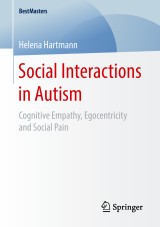Details

Social Interactions in Autism
Cognitive Empathy, Egocentricity and Social PainBestMasters
|
CHF 77.00 |
|
| Verlag: | Springer |
| Format: | |
| Veröffentl.: | 24.04.2018 |
| ISBN/EAN: | 9783658220136 |
| Sprache: | englisch |
Dieses eBook enthält ein Wasserzeichen.
Beschreibungen
Helena Hartmann examines the crucial concepts of cognitive empathy, emotional egocentricity and social pain of individuals with Autism Spectrum Disorder (ASD). She thereby provides valuable insights into the investigation of social cognition of both the neurotypical as well as autistic population. Since past research has revealed that individuals with ASD often face problems regarding cognitive empathy, they might also exhibit more difficulties in correctly classifying and distinguishing feelings of themselves and other people. In order to verify this hypothesis, one group with and one without ASD underwent functional magnetic resonance imaging while playing Cyberball, a virtual ball-toss game known to create feelings of social inclusion or exclusion. These findings should not only expand former research but also contribute to a better understanding of the social and emotional impairments of this group.<p> <br><br> </p>
Self-Other-Distinction and Emotional Egocentricity.- Empathy for Physical and Social Pain.- Cyberostracism and Egocentricity in Autism Spectrum Disorder.- Limitations of Past Research.- Knowledge about the Neural Bases of Empathy and Egocentricity.
Helena Hartmann is currently a PhD student at the Social, Cognitive and Affective Neuroscience Unit at the Faculty of Psychology of the University of Vienna.
Helena Hartmann examines the crucial concepts of cognitive empathy, emotional egocentricity and social pain of individuals with Autism Spectrum Disorder (ASD). She thereby provides valuable insights into the investigation of social cognition of both the neurotypical as well as autistic population. Since past research has revealed that individuals with ASD often face problems regarding cognitive empathy, they might also exhibit more difficulties in correctly classifying and distinguishing feelings of themselves and other people. In order to verify this hypothesis, one group with and one without ASD underwent functional magnetic resonance imaging while playing Cyberball, a virtual ball-toss game known to create feelings of social inclusion or exclusion. These findings should not only expand former research but also contribute to a better understanding of the social and emotional impairments of this group.<div><br></div><div><b>Contents</b></div><div><ul><li>Self-Other-Distinction and Emotional Egocentricity<br></li><li>Empathy for Physical and Social Pain<br></li><li>Cyberostracism and Egocentricity in Autism Spectrum Disorder<br></li><li>Limitations of Past Research<br></li><li>Knowledge about the Neural Bases of Empathy and Egocentricity<br></li></ul></div><div><b>Target Groups</b></div><div>Students and scientists in clinical psychology, biological psychology and neuroscience</div><div><br></div><div><b>The Author</b></div><div><b>Helena Hartmann</b> is currently a PhD student at the Social, Cognitive and Affective Neuroscience Unit at the Faculty of Psychology of the University of Vienna.</div>
Study in Clinical Psychology
Diese Produkte könnten Sie auch interessieren:

Der gesundheitspolitische Stellenwert der Tiergestützten Therapie in Deutschland

von: Nadine Kahlert

CHF 14.00















